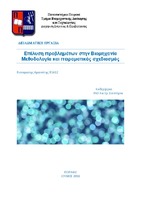Επίλυση προβλημάτων στην βιομηχανία : μεθοδολογία και πειραματικός σχεδιασμός

Προβολή/
Λέξεις κλειδιά
Νερό -- Επεξεργασία ; Αλουμίνιο ; Χύτευση αλουμινίου ; Πρόσθετα ; Χημικά ; Ποιότητα νερούΠερίληψη
Το νερό ψύξης παίζει σημαντικό ρόλο στην εξαγωγή θερμότητας τόσο από το καλούπι χύτευσης όσο και του μετάλλου που στερεοποιείται κατά τη διάρκεια της Αμέσου Ψύξης Χύτευσης κραμάτων αλουμινίου και χαρακτηρίζεται από πολύπλοκα φαινόμενα βρασμού (στρωματική εξάτμιση, πυρηνικός αναβρασμός) στα στάδια μεταφοράς θερμότητας. Ο ρυθμός απομάκρυνσης θερμότητας κατά τη διάρκεια της ψύξης εξαρτάται και από τη θερμοκρασία της επιφάνειας μετάλλων και μπορεί να αλλάξει σε συνάρτηση με το χρόνο, καθώς η μπιγιέτα κρυώνει. Προκύπτει λοιπόν ότι η σταθερή ποιότητα του νερού αποτελεί προαπαιτούμενο εάν επιδιώκουμε να χυτεύουμε υψηλής ποιότητας προϊόντα με υψηλή απόδοση της παραγωγικής διαδικασίας. Συνεπώς, η μη ελεγχόμενη ψύξη μπορεί να προκαλέσει διακυμάνσεις στην θερμοβαθμίδα κατά την στερεοποίηση των κόκκων με αποτέλεσμα να αναπτυχθούν εσωτερικές τάσεις που συχνά οδηγούν σε τρεξίματα του υλικού ή ρωγμές στο χυτευόμενο προϊόν.
Ωστόσο, βοηθητικά υλικά που χρησιμοποιούνται στην παραγωγική διαδικασία της χύτευσης όπως λιπαντικά -ακόμα και εάν συμμετέχουν σε μικρές ποσότητες- αποστραγγίζουν στις ίδιες δεξαμενές του ανοιχτού συστήματος του νερού ψύξης με αποτέλεσμα να αναμιγνύονται με αυτό. Επιπλέον, η αποθετική και διαβρωτική συμπεριφορά αποτελούν τα σημαντικά προβλήματα του νερού και είναι στενά συνδεδεμένα με την μη σταθερή ποιότητά του που προκαλείται από την τάση του CaCo3 να διαλυθεί ή να καθιζάνει. Τέλος οι αυξημένες θερμοκρασίες του νερού διαδραματίζουν βασικό ρόλο στην ανάπτυξη των μικροοργανισμών και την ανάπτυξη του βιοφίλμ που χτίζει μέσα στο κύκλωμα. Ως εκ τούτου, ανάπτυξη βιοφίλμ μειώνει την αποτελεσματικότητα του συστήματος και μπορεί επίσης να οδηγήσει σε μια σειρά από άλλα προβλήματα μέσα σε ένα ανοιχτό κύκλωμα (κλειστού βρόγχου), όπως απόφραξη των βαλβίδων και σωληνώσεων, κάτω από τη διάβρωση των αποθέσεων τα οποία προστατεύουν τα βακτήρια που υπάρχουν στο βιοφίλμ από οποιαδήποτε βιοκτόνα στο σύστημα.
Αυτές οι παράμετροι που μπορεί πάντα να μετρούνται άρα να είναι γνωστές και ελεγχόμενες επηρεάζουν την ψυκτική ικανότητα του νερού. Η κλιμάκωση της συγκέντρωσης μολυσματικών ουσιών οδηγεί σε μια συνεχή αλλαγή της ποιότητας του νερού η οποία αφενός δεν μπορεί να συντηρήσει την απαιτητική διαδικασία παραγωγής αφετέρου να διασφαλίσει συνθήκες υγιεινής για τις ανάγκες του προσωπικού σε νερό για καθαριότητα.
Ο ορισμός των κρίσιμων παραμέτρων στην προδιαγραφή του νερού και ο αποτελεσματικός έλεγχός τους καθιστά την διαδικασία ελέγχου προαπαιτούμενο της διαδικασίας. Έχουμε ακόμη να σκεφτούμε και αποφασίσουμε αν θέλουμε να έχουμε μη αναμίξιμα λιπαντικά που τελικά θα απορροφηθούν με κατάλληλα μέσα από την επιφάνεια του φρεατίου ή με ειδικά πρόσθετα να τα κάνουμε διαλυτά στο νερό ελέγχοντας τις παραμέτρους της προδιαγραφής ακολουθώντας τις σχετικές διαδικασίες πάντα σε σχέση με τις περιβαλλοντικές διαδικασίες και τα πρότυπα ποιότητας.
Οι δοκιμές για την παρατήρηση και την διαπίστωση των αλληλεπιδράσεων κατά τη χρήση των χημικών ουσιών πραγματοποιήθηκαν σε πραγματικές συνθήκες. Οι χημικές ουσίες που χρησιμοποιούνται αφορούν την αντιμετώπιση της αποθετικής και διαβρωτικής συμπεριφοράς,
σταθεροποιητές σκληρότητας και βιοκτόνο που επηρεάζουν την ψυκτική ικανότητα του νερού σχηματίζοντας το τρίγωνο νερού ψύξης.


